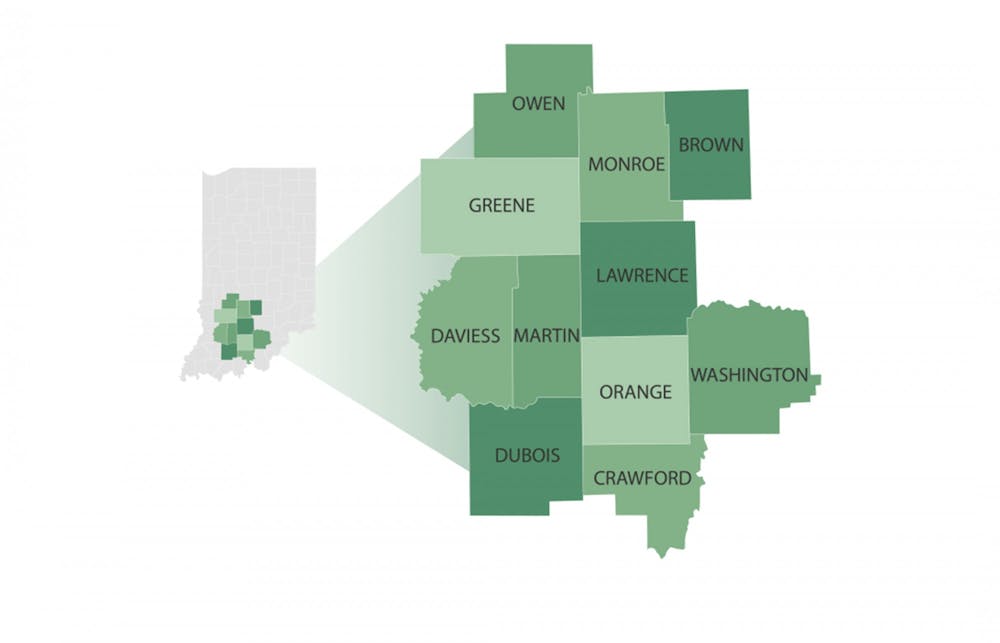IU is partnering with the Indiana Department of Health, Purdue University and other organizations as part of the Indiana Healthy Opportunities for People Everywhere initiative to improve access to healthcare and other resources.
According to a Nov. 30 news release, the initiative, which recently received a $34.8 million grant, will send teams throughout the state to gather information and develop strategies to assist residents to make healthier adjustments to their lifestyles. These teams will analyze persistent health risk factors as well as the impact of the pandemic on residents' lifestyles.
Some of these health risk factors include smoking, access to nutritional food, access to COVID testing and resources and access to other basic health-related resources.
The School of Public Health, Center for Rural Engagement and Sustainable Food Systems Science will work together to address these health inequities. These groups will target disparities in counties in the Indiana Uplands region.
The region includes Brown, Monroe, Owen and other counties.
Julia Valliant, assistant research scientist for SFSS, is leading a nutrition prescription program for residents in these counties. Valiant said her team’s approach to improving the access to nutritional foods is similar to treating ailments through prescription drugs.
“Caring for ourselves with food can be as effective as caring for ourselves with pharmaceuticals, for certain disease states,” she said.
Valliant’s team will work with local grocery stores and farmer’s markets to provide a four-month program where residents can receive packages with healthily-focused foods and directions on how to cook them. These boxes will also include advice and suggestions on how to cook healthily on a budget and how to read and interpret a nutrition label.
“It's like a little pulse, new information and also community building.” Valliant said. “Part of it establishes this community of people who are working hard to take care of their health through food.”
Valliant said building a robust system like this within communities is what will improve the resiliency of individuals, especially in the context of public health crises.
“The program will network them with one another and it will build relationships with the food providers and the educators and medical providers in the communities where we're working,” Valiant said.
School of Public Health professor Jon Macy will lead a project to encourage mothers and their partners to quit smoking. Macy said so far his team has found Orange county and Crawford county to have higher rates of smoking relative to other counties. Smoking can be harmful to both a mother and her child during and after pregnancy, Macy said.
Macy said that the two most effective methods they have seen to discourage smoking is testing the monoxide levels in mothers and providing financial incentives — often prepaid gift cards — to both mothers and spouses if they stop smoking. Effectively discouraging mothers from smoking can greatly improve the health of both her and her children, Macy said.
“Moms in our study down in Paoli have told us that that's a powerful piece of feedback information that helps them reduce their smoking,” she said.
The pandemic has made it more difficult for his team to continue offering the assistance they wish.
“One shot projects that are very limited in scope are not going to cut it if we're looking for large improvements in health status across a big population,” Macy said.
Additionally, professor Priscilla Barnes of the School of Public Health and Gabriel Piser of the Center for Rural Engagement will direct two additional projects within these counties.
Barnes and her project will use community health improvement planning to improve access to coronavirus testing. Additionally her team will work to improve residents’ access to physical health, mental health and social support services. They will also expand resources to address basic needs for residents.
Piser will lead a project as a part of the initiative, targeting racial disparities within healthcare in Dubois county. The Center for Rural Engagement is partnering with the Association of Latin Americans in Southern Indiana, LifeSpring Health Systems and other community stakeholders to implement an 18-month plan to improve health equity, Piser said.
Piser and his team plan to include the creation of bilingual, locally adapted educational materials, a comprehensive media and communications strategy. Additionally, the team will put on a large-scale community health fair with bilingual healthcare workers for Hispanic families.






